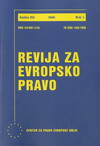THE INFLUENCE OF THE EUROPEAN PARLIAMENT ON POLICY OUTCOMES ACROSS DIFFERENT LEGISLATIVE PROCEDURES: IMPLICATIONS ON THE LEGAL INTEGRATION OF THE EUROPEAN UNION
THE INFLUENCE OF THE EUROPEAN PARLIAMENT ON POLICY OUTCOMES ACROSS DIFFERENT LEGISLATIVE PROCEDURES: IMPLICATIONS ON THE LEGAL INTEGRATION OF THE EUROPEAN UNION
Author(s): Sonja LučićSubject(s): Law, Constitution, Jurisprudence
Published by: Удружење за европско право - Центар за право Европске уније
Keywords: EU; legislative procedure; European Parliament
Summary/Abstract: Setting aside theoretical debate as to whether EP’s power can be called conditional agenda-setting or unconditional veto power, and moving beyond theoretical models, it is obvious that the role EP has in EU legislative process has been steadily increasing over years. With the development of the European Union, the scope of its supranational component has been increasing. What has actually been happening is so called spill over effect. In case of EP it is both political and functional spill overs that brought about the increase of its powers: from consultation procedure and advisory role of the EP, to COD II as a classical bicameral legislative procedure with EP being equal player to the Council of Ministers. Bearing in mind predominantly pro-integration position of the EP, its greater involvement in the EU legislative process has had huge impact on both qualitative and quantitative aspect of the EU legal system. Despite those developments, there still are certain areas in which the member states have exclusive competencies reserved to themselves. In all those areas the power of EP is very limited or does not exist. Regardless of the political sensitivity of certain issues, the functional spill over might lead to a greater involvement of the EP even in their design in the future, which would contribute to further integration, including legal, at the EU level.
Journal: Revija za evropsko pravo
- Issue Year: 5/2003
- Issue No: 1-3
- Page Range: 65-78
- Page Count: 14
- Language: English

